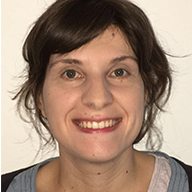28.10.2016
Pressemitteilung: Emmy Noether-Programm-Stipendium für Ivana Nikić
Dr. Ivana Nikić vom Werner Reichardt Centrum für Integrative Neurowissenschaften (CIN) der Universität Tübingen hat sich erfolgreich beim Emmy Noether-Programm der DFG beworben. Mit der Förderung in Höhe von ca. 1,3 Millionen Euro über fünf Jahre wird sie ihre Forschung auf dem Gebiet der nanometergroßen Bildgebung von neuroinflammatorischen Erkrankungen vorantreiben (Press release in English only).
Super Resolution Microscopy is probably one of the most promising and exciting fields in modern molecular biology. Allowing for images of objects in the nanometer scale, such as individual molecules, its sheer potential is still hard to assess, but is expected to be enormous. Its development by Eric Betzig, William E. Moerner and Stefan Hell fetched the Nobel Prize in Chemistry in 2014. Just recently, the University of Tübingen acquired a young researcher who will be combining super-resolution microscopy with modern chemical biology-based techniques to mark and identify proteins in order to better understand neuroinflammatory diseases like multiple sclerosis (MS): Dr. Ivana Nikić, formerly of EMBL in Heidelberg, now a member of the CIN, the University of Tübingen’s cluster of excellence.
Dr. Nikić is currently setting up her laboratory. The CIN’s very own microscope capable of “super” resolutions of ca. 20 nanometers, a N-STORM by Nikon, has just been delivered. But in other areas, the research group leader has not yet finished the setting-up process of acquiring important equipment, as well as hiring lab personnel. With the grant (1.3 million Euros over five years) by the Emmy Noether Programme, she will be able to purchase additional equipment and hire staff.
Nikić is going to investigate into axonal damage in neuroinflammatory diseases. Axons are long extensions of neurons, used to communicate with other neurons and to connect to other brain areas. Axons are very vulnerable to infiltrating immune cells in case of inflammatory disease, such as MS in the central nervous system, often massively impairing brain functions. Ivana Nikić will concentrate on a form of neuroinflammatory axon damage called Focal Axonal Degeneration (FAD), that she discovered herself. To a certain extent early stages of FAD are reversible, so investigating its mechanisms on the molecular level might lead to clues how this and other forms of neuroinflammatory axon damage can be treated.
More in-depth research on imperfectly understood neuroinflammatory diseases such as MS is of the utmost importance. Therefore, it is good news that a young biologist active in this field was chosen by the DFG for their prestigious programme. Given the strict criteria for application, not to mention the rate of rejected proposals (ca. 80% according to the DFG itself), the grant constitutes a major success.
Still, Ivana Nikić herself remains grounded enough: “Of course I am overjoyed, this is a great honour, and a great opportunity! Personally, I just want to set up my research group. The Emmy Noether Programme will give me a lot of financial leeway in this, which I am extremely grateful for. Now it is time to get to work.”
Dr. Ivana Nikić, born 1981 in Belgrade, studied Molecular Biology and Physiology in Belgrade. She received her PhD in Human Biology at the Medical Faculty of Ludwig-Maximilian University, Munich, in 2011, for her work on axon damage in the context of multiple sclerosis. For this work, she also received the “Dr. Hildegard und Heinrich Fuchs Preis zur Förderung des medizinischen Nachwuchses”, an award for the best thesis of the Medical Faculty (LMU, Munich), in 2012. From 2012 to 2016, she was a postdoctoral fellow at EMBL, Heidelberg, with an EMBO Long-Term Fellowship and a Marie Curie IntraEuropean Fellowship.
Emmy Noether (1882–1935) was a renowned mathematician of the 20th century. Although the theorem named after her is part of the basis for mathematical physics and she was one of the first female German mathematicians to qualify as a professor, she never received a full professorship in Germany. Since 1997, the DFG’s Emmy Noether Programme provides outstanding scientists and early career researchers an alternative path to professorship. It is intended to provide early career researchers with the opportunity to rapidly qualify for a leading position in science and research or for a university teaching career by leading an independent junior research group and assuming relevant teaching duties, without the need for a habilitation. As of 2015, the programme included 329 projects.
Organization:
- Werner Reichardt Centre for Integrative Neuroscience

